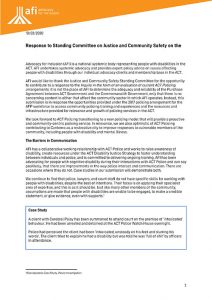
AFI statement on the proposed “Independent Assessments” for the NDIS
AFI is deeply alarmed about the announcement of ‘independent assessments’ or ‘functional capacity assessments’ in 2021, provided by allied health professionals chosen to assess people with disabilities using standardised testing tools, comparable to Job Seeker and Disability Support Pension assessments.
Disability advocacy organisations championed the model of choice and control at the beginning of the NDIS journey. Fast forward 8 years, the advocacy caseload at Advocacy for Inclusion is primarily NDIS.
Most concerning to AFI is the significant lack of community consultation with people with disabilities, their families and carers, support providers and advocacy organisations. For a significant change in the model of how eligibility and funding is assessed to access the NDIS, the disability community must be involved to provide their expertise and experience. We are also concerned at the ‘medicalised’ model that the ‘independent assessments’ focuses on. People with disabilities deserve the right to choose and control their own supports, and to be medically treated and assessed by clinical and allied health staff that they know well and are known in return.
We are conscious that the NDIS Act consists of numerous interpretative silences – and independent assessments will worsen this. There remains a problematic dearth of definitions in the NDIS Act, including for core terms such as ‘conditions’ and ‘impairment’. Furthermore, the NDIS Act does not provide criteria for determining the severity of a person’s ‘reduced functional capacity’, nor whether an impairment is ‘likely to be permanent’.
This is because, while the NDIS Act provides that impairments “that vary in intensity may be permanent” and that persons with such impairments “are likely to require support” for their lifetime, it does not address the impact of such variations on the assessment of functional capacity.
AFI remains concerned that the ambiguity and interpretation of ‘substantially reduced functional capacity’. This will cause significant difficulties for people with fluctuating conditions, and this will worsen under a standardised model of independent assessments led by allied health who do not embrace the social model of disability.
Standardised testing cannot measure the lives of people with a disability in a neat, packaged box. People with disabilities have complex, multifaceted lives that require different elements of support and care. This model will render more people ineligible for the NDIS, with increased AAT appeals applications and burden on advocacy organisations.
The NDIS was originally designed to move Australia into a social model of disability. The independent assessments or ‘functional capacity assessments will push Australia back into a medical model, where people are assessed in a medical capacity.
People with disabilities deserve a fair, working NDIS model that is not continuously changing.
If you are concerned about these changes you can give feedback to the NDIS by their online feedback form or email feedback@ndis.gov.au.
For Comment:
Carla Millner-Bradley
Office and Communications Manager
02 6257 4005
